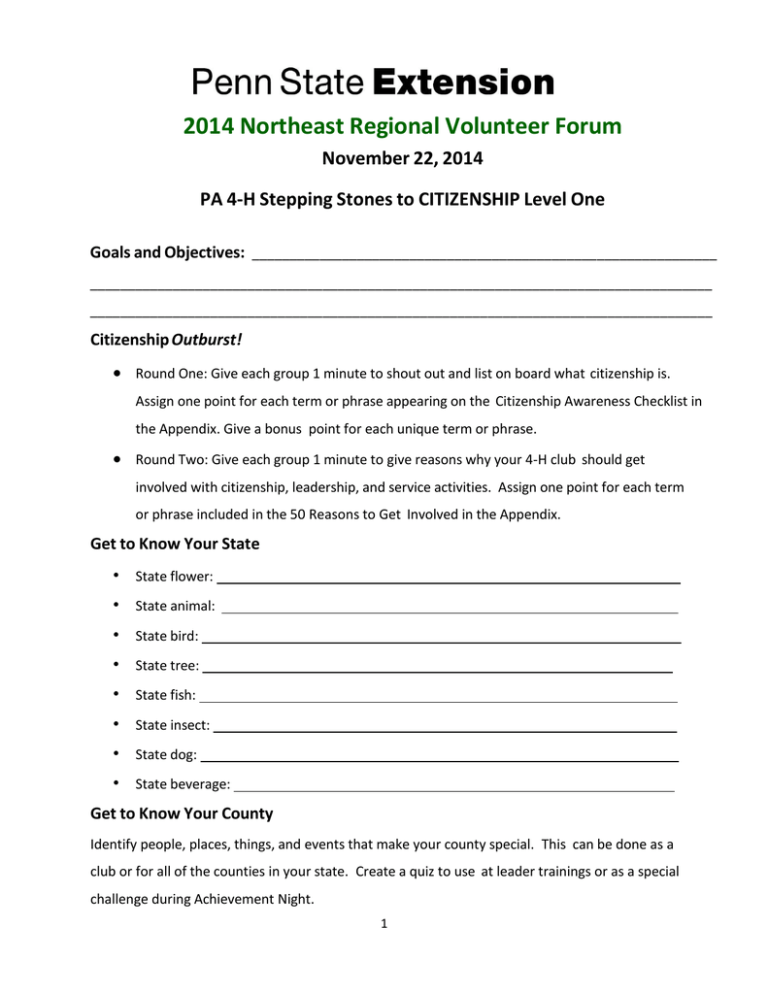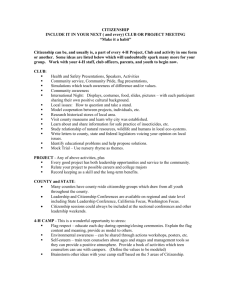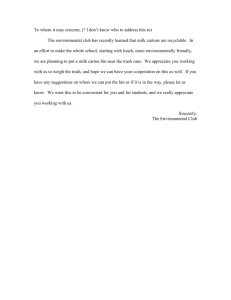2014 Northeast Regional Volunteer Forum November 22, 2014
advertisement

2014 Northeast Regional Volunteer Forum November 22, 2014 PA 4-H Stepping Stones to CITIZENSHIP Level One Goals and Objectives: ______________________________________________________________ ___________________________________________________________________________________ ___________________________________________________________________________________ Citizenship Outburst! Round One: Give each group 1 minute to shout out and list on board what citizenship is. Assign one point for each term or phrase appearing on the Citizenship Awareness Checklist in the Appendix. Give a bonus point for each unique term or phrase. Round Two: Give each group 1 minute to give reasons why your 4-H club should get involved with citizenship, leadership, and service activities. Assign one point for each term or phrase included in the 50 Reasons to Get Involved in the Appendix. Get to Know Your State • State flower: • State animal: • State bird: • State tree: • State fish: • State insect: • State dog: • State beverage: Get to Know Your County Identify people, places, things, and events that make your county special. This can be done as a club or for all of the counties in your state. Create a quiz to use at leader trainings or as a special challenge during Achievement Night. 1 Cultural Awareness What people groups live in your community? In what ways do they celebrate their cultural heritage? ______________________________________________________________________________________ ______________________________________________________________________________________ Share What similarities and differences are there among communities? How can you increase your club members’ cultural awareness? __________________________________________________________ ____________________________________________________________________________________ Taking Steps to Service Learning Practice, using the scenario described below: You took out-of-town guests to your neighborhood park recently. Your guests commented on the amount of trash near the picnic area. You noticed that there are no trash cans. 1. __________________________________________________________________ 2. __________________________________________________________________ 3. Plan for Action a. What do you need to know? ______________________________________________________ b. What permissions might you need? _________________________________________________ c. What are your resources? ________________________________________________________ d. What could your club do? ________________________________________________________ 4. __________________________________________________________________________________ 5. _________________________________________________________________________________ Public Speaking – Practice makes the Best Better! From the pictures on the screen, you will have one minute to plan a speech about an item and another minute to present a speech. Are you willing to give it a try? ___________________________________ ____________________________________________________________________________________ ____________________________________________________________________________________ ____________________________________________________________________________________ ____________________________________________________________________________________ 2 Appendix Citizenship Awareness Check List What does citizenship mean to you? Citizenship means different things to different people. Use a poster or white board to make a list of what you think citizenship means. Use the list below to help you get started or to fill in your definition. How you define citizenship can be used as a stepping stone to generate ideas and suggestions to get involved in a citizenship project. Community involvement Leadership Voting Being honest Knowing about local government Keeping property neat Becoming involved in community service Knowing local issues Decision making Visiting the capital Abiding by the law Cooperating Being a good neighbor Helping the handicapped Civil rights Visiting prisoners Restoring a cemetery Taking a stand on political issues Reporting vandalism Knowing the election process Belonging to a civic group Attending town meetings Helping a sick friend Doing something for others Reporting bullying Knowing local history Telling a friend to stop drinking Saying no to harmful behaviors Joining a 4-H club Citizenship is: My ideas: ______________________________ _____________________________________ _____________________________________ _____________________________________ My club’s definition: _________________________________________________________________________________ _________________________________________________________________________________ 3 50 Reasons to Get Involved with Citizenship, Leadership & Service Activities:1 Activity: Divide your group into teams. How many of these reasons can your club members guess in 2 minutes? Give one point for each reason checked off the list. You might want to give bonus points for additional reasons! 1 1. Meeting new friends 26. Empowering yourself 2. Having FUN 27. Building a better future 3. Making a difference for your community 28. To be responsible 4. For your children’s children 29. Bringing together your community 5. Caring about your world 30. Showing a good example 6. Learning new things 31. A good habit 7. Sharing your knowledge 32. Something to do with your friends 8. For a better tomorrow 33. Putting your knowledge to work 9. Educating others 34. Gaining experience 10. To be a good citizen 35. It’s neat! 11. Believing in people 36. Working with others 12. Making a change 37. Taking on a challenge 13. Getting your voice heard 38. Smiles 14. Warm, fuzzy feelings 39. Achievement 15. To be a good role model 40. Gaining a new perspective 16. Helping 41. To form a more perfect union 17. Connecting with others 42. Laughs 18. Good for your resume 43. Putting your beliefs into action 19. To keep a positive outlook 44. Giving to those in need 20. For your friends 45. Being powerful 21. Hope 46. Hugs 22. Giving back 47. Representing those without a voice 23. Kindness 48. Nurturing yourself 24. For your neighbors 49. Sharing compassion 25. Get recognition 50. Spreading peace From a PYD bookmark 4 Community Service2 Community Pledge 1. Identify the Problem Even the nicest towns aren’t perfect. What things in your community would you like to change or improve? Maybe your area needs less trash, less wasted energy, and less gossip; but more activities, law enforcement, and jobs. What can YOU and your 4-H club do to improve things? I promise to contribute my time and effort to learning about my community; to remember to look for the good in all people; 2. Gather Information and to do what I can to What caused or is causing the situation? Who is affected by the help make my problem? Who could you talk to about the problem? Would it help to community a better contact county government about this problem? place in which to live. For Example: You took out-of-town guests to your neighborhood park recently. Your guests commented on the amount of trash near the picnic area. You noticed that there were no trash cans. Who should you contact about this? What can your club do to help the situation? 3. Plan for Action Your club contacted the park manager at the borough office, who told you that the trash cans were missing. There was no money in the budget to buy new ones. You decide to hold a fundraiser to purchase new trash cans. What do you need to know? What permissions do you need? What are your resources (human, financial, physical, time). Each person in your club needs to accept a task and be given a deadline for completion. 4. Evaluation Your club raised enough money for 4 trash cans, which the borough purchased. They allowed you to paint the name of your club on the side. Now you need to discuss your action. Was the project finished on time? Did everyone do his/her job? Did people in the community know about the project? How did they feel about it? Did you remember to thank the appropriate people? 5. Looking Forward What is another project you would like to do? How can you use what you learned from this project to help you make the best better? 2 From “Getting to Know Your Community, Project 1 Member Guide, the Pennsylvania State University, n.d. 5 Essential Element – Service with Citizenship Opportunity to Value and Practice Service for Others What is Service-Learning? Service-learning allows you to learn something new and reflect on what you learn and discover as you provide service to your community. Example of community service: If you clean up trash and pollutants from a streambed, you are providing a service to the community by cleaning up the stream. Example of service-learning: When you analyze what you found within the streambed and the possible sources of pollution, you can (1) share the results with residents and public officials, and (2) offer suggestions for reducing pollution. You are engaged in a community clean-up project but are also learning about pollution sources and water quality. You practice communication skills when sharing what you learned with the community and public officials. Planning for Service-Learning Start to think about doing a service-learning activity. After you complete your service-learning activity, answer the following questions about your project: 1. How did you decide what to do? ____________________________________________________ 2. Describe your project. ____________________________________________________________ 3. What knowledge and skills did you gain? _____________________________________________ 4. What other people were involved? (parents, other 4-H’ers, agencies, groups) ________________ 5. What future plans do you have relating to this project? __________________________________ For more information about this project, contact Ann Dunkerton, akd11@psu.edu, chair of the Citizenship Committee of the Pennsylvania 4-H Positive Youth Development Team The Pennsylvania State University is committed to equal access to programs, facilities, admission and employment for all persons. It is the policy of the University to maintain an environment free of harassment and free of discrimination against any person because of age, race, color, ancestry, national origin, religion, creed, service in the uniformed services (as defined in state and federal law), veteran status, sex, sexual orientation, marital or family status, pregnancy, pregnancy-related conditions, physical or mental disability, gender, perceived gender, gender identity, genetic information or political ideas. Discriminatory conduct and harassment, as well as sexual misconduct and relationship violence, violates the dignity of individuals, impedes the realization of the University’s educational mission, and will not be tolerated. Direct all inquiries regarding the nondiscrimination policy to Dr. Kenneth Lehrman III, Vice Provost for Affirmative Action, Affirmative Action Office, The Pennsylvania State University, 328 Boucke Building, University Park, PA 16802-5901, email: kfl2@psu.edu, phone: 814-863-0471. 6



